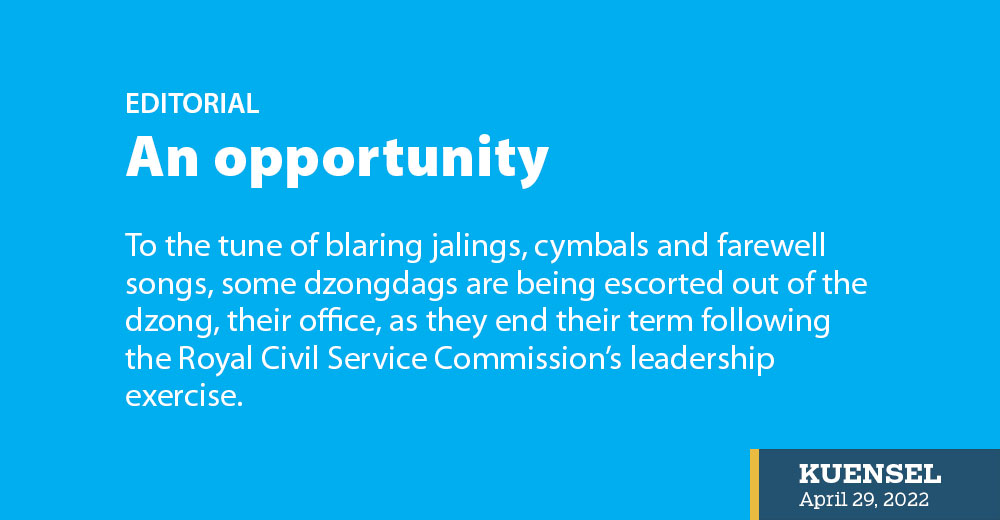To the tune of blaring jalings, cymbals and farewell songs, some dzongdags are being escorted out of the dzong, their office, as they end their term following the Royal Civil Service Commission’s leadership exercise. There are well-wishers and loads of good wishes, there are appreciation and regret for not being able to continue. Some are even disagreeing with the result of the exercise.
The reality is that some executive level civil servants are managed out. It is a reminder of the impermanence that we often hear of. It is also a wake up call for the rest of the people – at executive level – whether in the civil service, constitutional offices, public service corporations and the civil service organisations.
Interestingly, while there is surprise and some questions asked, there is also an acceptance among the public. Some are calling for similar exercise in all the institutions, schools and dratshang included. While we could ignore them as mere rattling, it also calls for some reflections. The premise is that the public is losing trust in all our machinery, whether it is a government agency, law or law keepers, the media, the financial institutions and even the big corporate bodies.
The public, the so-called end users, are frustrated with the service delivery whether from a government office or a corporate office, a bank or a CSO. Efficient service delivery has been at the centre of governance. Yet, after hearing this for years, we are still talking about prioritising service delivery.
The common man is convinced, even with all the changes, that it is not what you know, but who you know to avail services or opportunities. This can be finding a “seat” in a school, availing a loan or simple things like getting a clearance. What the public calls for is efficiency and unbiased services. If this happens, the farmer need not call his neighbour’s nephew in a high post to avail the service that he is entitled to. We talk about meritocracy, but many are convinced that finding a job is impossible without knowing someone in Thimphu.
The reforms should have an impact. It is unfortunately not what was intended. If the impact is discouraging civil servants in their prime age or in an important post to resign and see Australia as an alternative, the purpose of the reform is defeated.
The exercise should be taken up as an opportunity and a challenge. Young officers should aspire to fill the vacant post and face any assessment. If he/she is unfit, they too will move on. How many will rise above the apprehension that they too would be managed out? This is the opportunity the exercise provided. It dares all to earn a position or the status through professional competence and not seniority or favouritism or nepotism.
In this way, the exercise is appreciated as we aspire for professionalism and efficiency.


